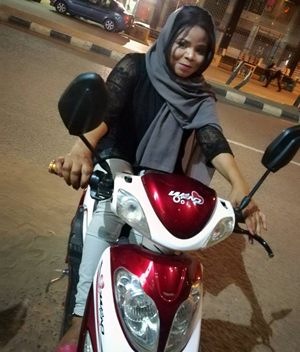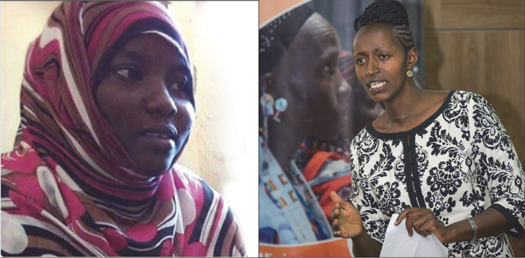Melania Trump’s Failed Opportunity To Address Plight Of Women
By Jehron Muhammad | Last updated: Oct 17, 2018 - 5:59:09 PMWhat's your opinion on this article?

U.S. First Lady Melania Trump in Africa Photo: Youtube
|
With much discussion on the continent about the limited impact of the #MeToo movement, the media raising the issue of limited education among Nigerian girls, the kidnapping of female students by Boko Haram and sexist, misogynist behavior in Sudan’s male dominated society, many saw the U.S. first lady’s visit as a lost opportunity to focus on the unequal treatment of women and girls in Africa.
In Sudan, Noura Hussein, age 19, was found guilty of premeditated murder in May and had faced execution for defending herself against being raped by her husband. But a month later, after a high profile campaign that involved Sudanese American women, some living in Washington, D.C., the death sentence was quashed. She was given a jail sentence and fined for manslaughter.
However, it has come to light that prosecutors are seeking to overturn the latest ruling and reinstate the death penalty.
Forced to marry at 16, the young woman fled, but was tricked to return to her husband by family members.
While Hussain’s case is making its way through the courts, Sudanese journalist and outspoken campaigner for women’s rights Wini Omer appeared in court, facing charges of prostitution and violating public morals. At the hearing, according to the UK-based Guardian newspaper, she was told that she could also face charges of spying against the government.
Her supporters say she is being targeted because of her human rights work, which this author discussed with her at length during her U.S. visit as a part of the Mandela Washington Young African Leadership Fellowship.
The cover of a Sudanese Arabic language newspaper, Al-Sudani, featured an interview with Khartoumbased school teacher and social activist Zakia Muhammad Sadeeg. She explained how and why she became Sudan’s first female motorcyclist, only to be “deliberately” hit from behind by a male driver of an American made car.
She prefaced her words by telling editor Deia Aldeen Belal, “Our society has restrictions and controls on everything related to the female.” She added, “Our society does not treat women as human beings … even when they are raped or harassed, they are blamed and criminalized.”

Zakia Muhammad Sadegg
|
She also noted the “success rate” of female students in Sudan receiving “certificates” of graduation outnumbered males. “This isn’t because we are more intelligent than men, it’s because our level of seriousness, commitment and attention to study” outweighs that of men, she said.
Concerning the accident, she told Al-Sudani, “A powerful four wheel drive vehicle … without slowing down” hit her from behind. Other “car owners put her in the vehicle that hit me, but he refused to take her to the hospital,” she said.
She said she sat bleeding for two hours before someone from her school arrived and drove her to a hospital.
Ms. Sadeeq was asked what could the first lady have done if she came to Africa and sat with women, female activists and advocates?
Not thinking of herself, that the accident she had cost her a job and her struggle to support herself, Ms. Sadeeq said she would have spoken to Mrs. Trump about the plight of girls like Noura Hussein and the sexist mentality of many men who objectify women, and want to prevent women from having their own voice.”
Sadeeg also mentioned, unlike Sudan, the low percentage of females who attend school in countries like Nigeria and how the #MeToo movement has had no discernible impact in Africa.
According to Africanews, “In fiercely patriarchal societies, where religion and tradition define the role of women, simply reporting domestic violence is so difficult that it is not even considered to bring down men of power, as #MetToo has allowed.”
In March in Uganda angry women, reported Africanews, used twitter to call for the resignation of MP Onesmus Twinamasiko, who during a television interview encouraged men to beat their wives to “punish” them.
“Yes, they need to be corrected a little, it’s even a proof of love,” he said. He later apologized, and his remarks had no consequences.
Wangechi Wachira, who heads the Center for Rights Education and Awareness (Creaw), a Kenyan women’s rights group, believes that while #MeToo talks to African women, many have been dissuaded from filing complaints by a justice system that is indifferent to their plight.

(l) Nora Hussein (r) Kenyan women’s rights activist Wangechi Wachira
|
Sadeeg believes, if the first lady had visited Nigeria she could have brought attention to ongoing kidnaping of young girls by Boko Haram, and the plight of female students in Africa’s largest country.
According to government 2017 figures, Nigeria has “the largest number of children out of school” in the world. UNICEF data estimates that 10.5 million children, 60 percent of them girls, are not in school. Poverty and child marriage are citied as key factors that keep girls from the classroom.
Concerning the first lady’s trip, Scheaffer Okore, a Kenyan who describes herself as an “Afro politico feminist,” told BuzzFeed News that she didn’t see Trump’s trip as more than a photo op.
“I simply don’t care because there’s an obviousness about her and her husband not really caring about the continent or anything specifically African,” she said, and “this tour seems to be more about exploration than anything with serious intent.”
Follow @jehronmuhammad on Twitter.
INSIDE STORIES AND REVIEWS
-
-
About Harriett ... and the Negro Hollywood Road Show
By Rabiah Muhammad, Guest Columnist » Full Story -
Skepticism greets Jay-Z, NFL talk of inspiring change
By Bryan 18X Crawford and Richard B. Muhammad The Final Call Newspaper @TheFinalCall » Full Story -
The painful problem of Black girls and suicide
By Charlene Muhammad -National Correspondent- » Full Story -
Exploitation of Innocence - Report: Perceptions, policies hurting Black girls
By Charlene Muhammad -National Correspondent- » Full Story -
Big Ballin: Big ideas fuel a father’s Big Baller Brand and brash business sense
By Bryan Crawford -Contributing Writer- » Full Story






 Click Here Stay Connected!
Click Here Stay Connected!








